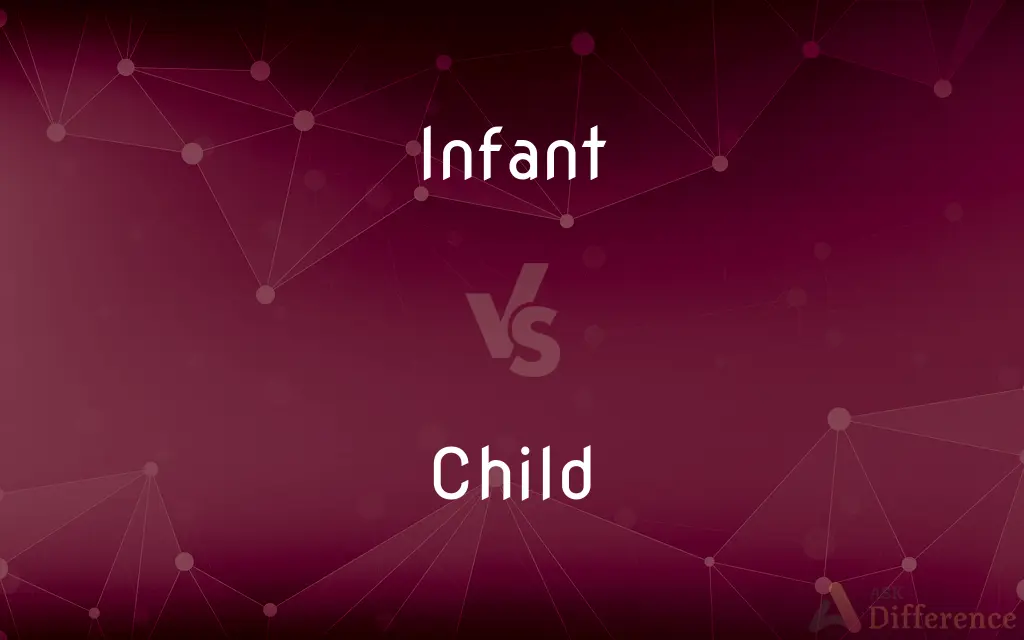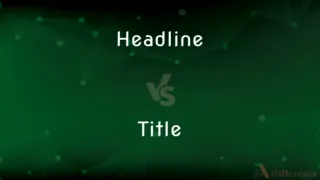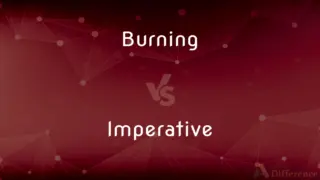Infant vs. Child — What's the Difference?
By Tayyaba Rehman — Updated on September 28, 2023
An infant is a very young child, typically under one year old, while a child refers to an individual from birth to adolescence.

Difference Between Infant and Child
Table of Contents
ADVERTISEMENT
Key Differences
An infant is a term that specifically denotes the earliest stage of a human's life, generally the period from birth to 12 months. It's a time characterized by rapid growth and development. Infants rely heavily on caregivers, as they are incapable of self-sustenance. On the other hand, a child has a broader age span. Starting from birth, it encompasses infancy and goes up to the onset of adolescence, usually around 13 years old.
While an infant is always a child due to falling under the larger age bracket the term "child" covers, not every child is an infant. For example, a 5-year-old is a child but no longer an infant. The infant stage is filled with firsts - first words, first steps, and more. A child, as they grow, develops more advanced cognitive, motor, and social skills, gradually becoming more independent.
The care and attention an infant needs differ significantly from that of an older child. Infants are more vulnerable and require constant monitoring. They have yet to develop basic motor skills, speech, or the ability to understand complex instructions. A child, as they move past infancy, begins to explore the world more independently, starts schooling, and forms more complex interpersonal relationships.
In medical and legal contexts, the word infant can have specific implications, often related to age limits for medical treatments or legal protections. Similarly, the term child in these contexts usually relates to rights, protections, and considerations that individuals under a certain age are entitled to.
Comparison Chart
Age Range
0-1 years old
Birth to adolescence (~0-13 years)
ADVERTISEMENT
Dependency Level
Highly dependent on caregivers
Reducing dependency as they grow
Developmental Stage
Beginning of motor & cognitive skills
Expanding motor, cognitive, and social skills
Legal Definition
Varies, but often refers to a child under one year
Varies, often up to age 18
Physical Abilities
Limited to basic reflexes & movements
Progressing physical abilities like walking, running, etc.
Compare with Definitions
Infant
A very young child, especially under one year
The infant giggled as she played with the rattle.
Child
A young human being below adolescence
The child excitedly opened his birthday presents.
Infant
A person in the earliest stage of something
The company was still an infant but showed promise.
Child
One's offspring, regardless of age
Even as an adult, she remained the cherished child of her elderly parents.
Infant
Relating to infants or infancy
Infant mortality rates have been decreasing globally.
Child
Biologically, a child (plural children) is a human being between the stages of birth and puberty, or between the developmental period of infancy and puberty. The legal definition of child generally refers to a minor, otherwise known as a person younger than the age of majority.
Infant
Legally, a person not yet of age
As an infant, she was represented by her parents in the lawsuit.
Child
A person between birth and puberty.
Infant
An infant (from the Latin word infans, meaning 'unable to speak' or 'speechless') is the more formal or specialised synonym for the common term baby, meaning the very young offspring of human beings. The term may also be used to refer to juveniles of other organisms.
Child
A person who has not attained maturity or the age of legal majority.
Infant
A child in the earliest period of life, especially before being able to walk.
Child
An unborn infant; a fetus.
Infant
(Law) A person under the legal age of majority; a minor.
Child
An infant; a baby.
Infant
A very young nonhuman mammal, especially a primate.
Child
One who is childish or immature.
Infant
Of or being in infancy.
Child
Someone to whom a specified person is a parent.
Infant
Intended for infants or young children.
Child
A member of a tribe; descendant
Children of Abraham.
Infant
Newly begun or formed
An infant enterprise.
Child
An individual regarded as strongly affected by another or by a specified time, place, or circumstance
A child of nature.
A child of the Sixties.
Infant
A very young human being, from conception to somewhere between six months and two years of age after birth, needing almost constant care and attention.
Child
A product or result of something specified
“Times Square is a child of the 20th century” (Richard F. Shepard).
Infant
(legal) A minor.
Child
A person who has not yet reached adulthood, whether natural (puberty), cultural (initiation), or legal (majority).
Go easy on him: he is but a child.
Infant
(obsolete) A noble or aristocratic youth.
Child
A kid aged 1 to 11 years, whereas neonates are aged 0 to 1 month, infants are aged 1 month to 12 months, and adolescents are aged 12 years to 18 years.
Regular chores can be appropriate for both children and adolescents, given age-appropriate limits on difficulty level and time on task.
Infant
(obsolete) To bear or bring forth (a child); to produce, in general.
Child
(with possessive) One's direct descendant by birth, regardless of age; one's offspring; a son or daughter.
My youngest child is forty-three this year.
His adult children visit him yearly.
Infant
A child in the first period of life, beginning at his birth; a young babe; sometimes, a child several years of age.
And tender cries of infants pierce the ear.
Child
(cartomancy) The thirteenth Lenormand card.
Infant
A person who is not of full age, or who has not attained the age of legal capacity; a person under the age of twenty-one years; a minor.
Child
(figurative) A figurative offspring, particularly:
Infant
Same as Infante.
Child
A person considered a product of a place or culture, a member of a tribe or culture, regardless of age.
The children of Israel.
He is a child of his times.
Infant
Of or pertaining to infancy, or the first period of life; tender; not mature; as, infant strength.
Child
Anything derived from or caused by something.
Infant
Intended for young children; as, an infant school.
Child
(computing) A data item, process, or object which has a subservient or derivative role relative to another.
The child node then stores the actual data of the parent node.
Infant
To bear or bring forth, as a child; hence, to produce, in general.
This worthy motto, "No bishop, no king," is . . . infanted out of the same fears.
Child
Youth of noble birth
Infant
A very young child (birth to 1 year) who has not yet begun to walk or talk;
Isn't she too young to have a baby?
Child
(mathematics) A subordinate node of a tree.
Infant
A beginner or novice
Though an infant in the world of skiing, he was eager to learn.
Child
A female child, a girl.
Child
To give birth; to beget or procreate.
Child
A son or a daughter; a male or female descendant, in the first degree; the immediate progeny of human parents; - in law, legitimate offspring. Used also of animals and plants.
Child
A descendant, however remote; - used esp. in the plural; as, the children of Israel; the children of Edom.
Child
One who, by character of practice, shows signs of relationship to, or of the influence of, another; one closely connected with a place, occupation, character, etc.; as, a child of God; a child of the devil; a child of disobedience; a child of toil; a child of the people.
Child
A noble youth. See Childe.
Child
A young person of either sex. esp. one between infancy and youth; hence, one who exhibits the characteristics of a very young person, as innocence, obedience, trustfulness, limited understanding, etc.
When I was child. I spake as a child, I understood as a child, I thought as a child; but when I became a man, I put away childish things.
Child
A female infant.
A boy or a child, I wonder?
Child
To give birth; to produce young.
This queen Genissa childing died.
It chanced within two days they childed both.
Child
A young person of either sex;
She writes books for children
They're just kids
`tiddler' is a British term for youngsters
Child
A human offspring (son or daughter) of any age;
They had three children
They were able to send their kids to college
Child
An immature childish person;
He remained a child in practical matters as long as he lived
Stop being a baby!
Child
A member of a clan or tribe;
The children of Israel
Child
A son or daughter of any age
She was the only child of her parents.
Child
An individual influenced by certain conditions or experiences
He was a child of the 90s, growing up with grunge music and slap bracelets.
Child
A person who is naive or lacks adult experience
In matters of the heart, he was still a child.
Common Curiosities
Is "infant" used metaphorically?
Yes, "infant" can be used to describe someone new to a particular field or activity.
Can the term "child" refer to teenagers?
Yes, "child" can often include teenagers, but context is essential.
Is every infant a child?
Yes, every infant is a child, but not every child is an infant.
What's the primary difference between an infant and a child?
An infant is a specific age range (0-1 years), while "child" covers a broader span from birth to adolescence.
At what age does an infant transition to toddler?
Typically, at the age of 12 months or when they start walking.
Share Your Discovery

Previous Comparison
Headline vs. Title
Next Comparison
Burning vs. ImperativeAuthor Spotlight
Written by
Tayyaba RehmanTayyaba Rehman is a distinguished writer, currently serving as a primary contributor to askdifference.com. As a researcher in semantics and etymology, Tayyaba's passion for the complexity of languages and their distinctions has found a perfect home on the platform. Tayyaba delves into the intricacies of language, distinguishing between commonly confused words and phrases, thereby providing clarity for readers worldwide.
















































